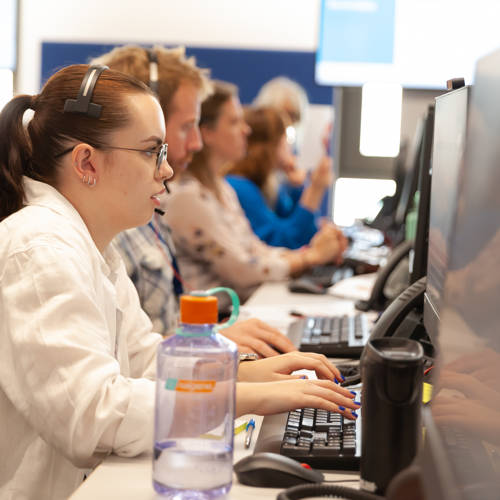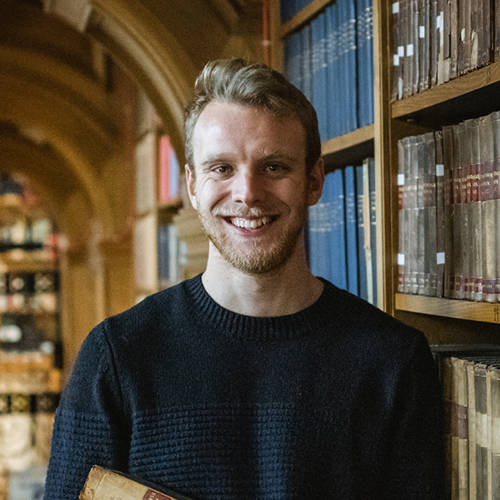Overview
Discover how science and investigation come together to solve crimes with our BSc (Hons) Forensic Investigation with Criminal Investigation degree. This course blends the practical skills of forensic science with the analytical knowledge of criminal investigation, preparing you for a career in the Criminal Justice System, forensic services, or law enforcement.
From the crime scene to the courtroom, you’ll explore how crimes are investigated, and how evidence is collected, analysed, and used to support justice. Alongside expert teaching, you’ll train in specialist facilities, including crime scene flats, mock courtrooms, and our award-winning Anatomy Learning Centre.
What you'll learn
- Investigate criminal behaviour and the processes involved in criminal investigations, from initial response to case resolution.
- Develop skills in interviewing witnesses and suspects, understanding the legal and ethical considerations involved.
- Analyse the role of forensic evidence in the courtroom, including the presentation and interpretation of scientific findings.
- Explore the impact of miscarriages of justice and the importance of critical evaluation in investigative processes.
- Put skills to practice through Hydra, our innovative simulation learning experience.
Blending theory with practice, this degree will give you the opportunity to work on real-world cases, helping you build the skills and experience to enter a range of professions upon graduation.
Why study Forensic Investigation at CCCU?
- Select your qualification
- Select your grade
- Add it and repeat
Accepted qualifications
We accept a wide range of general qualifications that attract UCAS Tariff points either on their own or in combination with others. Below are some common examples.
| Qualification | Grades |
|---|---|
| A Levels | BBC |
| BTEC | DMM |
| Access | 15 Distinctions and 30 Merits |
| International Baccalaureate | 29 Points |
The grades in this table provide an indication of what is required to study this course. If you have qualifications that are not present in the table or want to tell us more about you specific situation then please contact our friendly Course Enquiry Team.
Don’t meet these entry requirements?
If you do not meet these entry requirements, a foundation year is a great way of beginning your university journey. We recommend you speak to our Course Enquiries team who will advise on a route to study that fits you.
More information
Contact us
Module information
We know employers are looking for dynamic, open-minded graduates who can adapt, innovate, and collaborate. So we have designed a new way of teaching and learning to ensure that you are work-ready for when you graduate. Alongside the modules below you will choose from our new curriculum that will help you achieve student success, engage with contemporary topics and work with industry or the community.
As well as the core modules, you will also have the opportunity to study a number of option modules. The availability of specific option modules may vary from year to year. This will be subject to a minimum number of students choosing the module and staff availability. It means we cannot guarantee the availability of a particular option module. However, we will ensure you have a choice of option modules.
Core/optional modules
*Modules subject to approval
How you’ll learn
You will be taught through a combination of lectures, seminars, workshops and practical sessions, typically having around 10-14 class contact hours per week, supported by additional online materials. Your actual contact hours depend on the modules you take.
Lectures are used to provide information, and these are supported by small group seminars to enable discussion. Practical sessions allow you to apply your theory to a practical situation and workshops will support you with key skills development. Tutorials are available to provide one-to-one support.
The team is dedicated to your professional development and they provide many sessions to help you develop personal, as well as academic skills. We know that coming to university can be rather daunting and you might feel you have lost your academic skills, so you can also elect to receive extra support from our central Learning Skills Hub.
The teaching sessions are interactive, allowing you to engage with the material on a deeper level, and all practical sessions are designed to enable you to apply theory to context. You will have the opportunity to use a range of specialist methods and equipment relevant to the modules you study, and we have a dedicated forensic suite, including a workshop and a range of internal and external crime scenes.
You will have the opportunity to gain extensive practical experience in sessions which are designed around real-life scenarios, often related to staff's real, previous case work. You will also have lectures from professionals working in the field who can bring you their valuable and captivating experiences. This provides context to theory and may provide you with future contacts in the fields which interest you.
We will support you with getting work experience and, where possible and depending upon your module choices, we arrange field trips that are designed to consolidate your knowledge (such as fire dynamics demonstrations, ballistics / shooting trips, and visits to relevant external organisations.)
All courses are informed by the University’s Learning and Teaching Strategy 2015-2022.
When not attending lectures, seminars, workshops, or other timetabled sessions you will have access to a range of resources we provide to continue learning through self-study. This typically involves reading journal articles and books, undertaking research in the library, working on projects, and preparing for coursework assignments or examinations, workshops, and seminars.
Your lecturers will direct you towards specific readings and/or activities where appropriate to complete before or after class and provide tutorials where necessary to support your learning.
We also recommend that you set up student study groups and support each other with your studies, as research shows that we learn much better in communities.
A range of study skills and employability workshops are available from the University and we encourage you to take advantage of these opportunities.
Each 30-credit module requires approximately 300 hours of learning, of which approximately 66 hours are taught class contact time, with the remaining being guided learning and independent study.
The teaching team consists of highly qualified and experienced forensic practitioners and academic researchers, who have a range of expertise and experiences. This experience is injected into teaching sessions and assessments to make your experience as realistic as possible.
The core team is supported by other staff in the University, drawn from the law, policing and criminology teams, and a range of professionals currently working in the field who provide guest lectures.
Our degree is taught by forensic practitioners who offer an informative, innovative, practical and rigorous course that will open up a vast range of career opportunities for you.Hellen Frost Course Director for Forensic Investigation
How you’ll be assessed
Assessments are a core part of the course, and each module has 1-3 assessments that contribute to the 4,000-word assessment quota. We ensure that each assessment is supported by written guides, study skills sessions and staff guidance.
You will be provided with a range of assessment types to allow you to play to your strengths, discover skills you didn't know you had, and provide you with the tools you need to meet some of the requirements of your future employers.
We provide opportunities for you to gain formative feedback before you complete the formal assessments. These opportunities can offer clarity and guidance to ensure that you can reach your full potential.
The assessment methods include written open-book examinations and a range of coursework assessments such as essays, reports, forensic paperwork, forensic statements, portfolios, oral presentations, and your final year dissertation.
Feedback
The team is dedicated to providing high quality feedback on all assessments to enable you to understand what action you need to take to improve your work and, consequently, your marks. We try to ensure that feedback is student-focused, supportive and constructive.
Your future career
This course provides an excellent grounding for any career that involves the collection, analysis and interpretation of information or evidence, as these skills are taught in core modules and transferable to many careers.
The graduate attributes that are routinely required by employers are embedded into the Forensic Investigation parts of your curriculum and therefore, graduates are normally able to evidence these skills, preparing them for a range of careers. This is evidenced by ex-students who have secured positions in forensic organisations, the UN, police forces, prisons, medical laboratories, schools and universities.
Many have gone onto higher degree studies at CCCU and other universities at home and abroad. We even have our own home-grown PhD students.
Many students have ambitions to become Crime Scene Investigators, and we are delighted they have achieved this dream locally (Kent) and further afield (London and elsewhere). The role requires immense dedication and resilience - we will do our best to support you in applying your knowledge and skills in this.
However, our guest lecturers bring with them a wealth of experiences, and students discover new ambitions and inspiration through their sessions.
What might you become?
Potential opportunities exist as investigators for: National Crime Agency, the Military, Independent Office for Police Conduct, Security Services, in commerce, and so on. You will be encouraged to make the most of the volunteering and networking opportunities available throughout your degree course, in addition to your studies, in order to enhance your employment prospects.
Studying Forensic Investigation at CCCU provided me with the knowledge, practical experience and personal skills required to adjust and adapt in my current career role. The course helped me develop my research skills and the practical facilities gave me the opportunity of real-world experience. I will always be grateful for the help and support the staff has provided me throughout my time at CCCU.IPResearcher for a UN missing persons unit
Related courses
Fees
Tuition Fees for 2026/27 have not yet been finalised. These course web pages will be updated with Tuition Fee information once they have been agreed.
- Read advice about funding your degree
- See information about the financial support available for undergraduate studies
- If you would like information about paying your fees, please contact accounts.receivable@canterbury.ac.uk
- For specific fee queries, please contact fees@canterbury.ac.uk
Industry links
We welcome visiting lecturers, who are practitioners working in the forensic field. They will share their expertise and experience with you to give you an insight into real life forensics. You may also have opportunities to participate in field trips.
One member of the teaching team is a trained coach and mentor and has injected this influence into the degree course structure, to enable students to develop as people and professionals, in addition to learning the subject. It is often personal qualities such as confidence that prevents us from reaching our potential, and this approach is actively helping students to overcome issues that might impact their success.
We have a range of external professionals involved in the delivery of the course and these professionals also act as advisors to the core lecturing team. They advise us on changes in legislation, procedure and trends, and aid the core team in course development, thereby ensuring that our degree is current, accurate and relevant to forensic employers.
We actively consult and collaborate with a range of forensic and related organisations and these change on a yearly basis, in response to changing operational commitments of these organisations and trends in forensic investigation. Collaborations include Kent Police, Kent Fire Brigade, Prometheus Fire Investigation, Metropolitan Police and a range of independent laboratories and professionals.
Professional accreditation
The Forensic Investigation course adheres to and is guided by the QAA Benchmark Statements for Forensic Science, which define expectations as part of the UK Quality Code for Higher Education.
Apply now
Duration:
3 yearsUCAS code:
F415Location(s):
CanterburyFind out more
Sign up to hear the latest from the University, including upcoming events, useful updates, student life and more!




